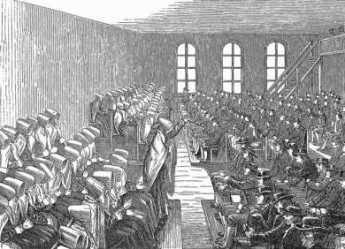Related Topics
Quakers: The Society of Friends
According to an old Quaker joke, the Holy Trinity consists of the fatherhood of God, the brotherhood of man, and the neighborhood of Philadelphia.
Quaker Values and Service
New topic 2016-12-03 20:19:53 description
Silence Connotes Assent: Only To Quakers

|
| British Parliament |
In 1604, the British Parliament considered the issue of what it should mean if Parliament remained silent on a topic. The English Civil War, King Versus Parliament, was soon to begin, so it was almost inevitable that Parliament would decide that in no sense, no way, was consent to be assumed from its silence. This common law principle endures to the present, and has been explicitly reaffirmed by the U.S. Supreme Court in the past few months. On an even simpler level, what is it to mean if the presiding officer called for the ayes, failed to solicit discussion or nays, and declared the matter settled? That's a fairly common error of inexperienced presiding officers -- and it's a common trick of manipulative partisan presiding officers, too.

|
| Quaker Meeting for Business |
Parliament soon made the 1604 declaration that if the presiding officer failed to call for the nays, the motion was not carried, no matter how many ayes there appeared to be.
In Quaker Meeting for Business, however, the reverse is true. A proposal is made and discussed until discussion ceases. At that point, some weighty member will announce, "I approve", and usually there will be a chorus of other approves. If there is further silence at that point, the matter is carried and entered into the minutes, which are read aloud for comment and correction, before the meeting adjourns. It's really remarkable how much business can be accomplished in an hour, using that procedure.
The essential difference is that the Quakers are striving for unanimity, while courts and parliaments are striving for a decision. If the issue is whether or not to tax activity or to hang a criminal, it is probably futile to hope for unanimous consent. The stated need here is to come to some judgment, any judgment, in a timely fashion. The Quaker goal is to reach consensus, which may take some members longer than others, but the assumption is that everyone will eventually get to the same point. One group counts votes, with the chairman casting the deciding vote in the event of a tie, while the other group holds a matter over to another meeting until a significant consensus emerges.
The irony of this situation is that a group which sincerely strives for unanimity will actually dispose of its business more quickly than a group which forces the pace to meet some artificial deadline. The Quaker system does break down when the urgency for a decision is greater than the pace of reaching unanimity. The Parliamentary system breaks down when the number of votes (whether a majority or a super-majority) required for a decision, is in fact less than that intangible level of agreement which keeps the organization from disintegrating.
Originally published: Monday, June 26, 2006; most-recently modified: Wednesday, June 05, 2019